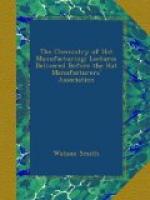Magnesia.—Suppose lime and magnesia are present. You may first evaporate to a small bulk, adding a drop of hydrochloric acid if the liquid becomes muddy. Then add ammonia and ammonium oxalate, when lime alone is precipitated as the oxalate of lime. Filter through blotting paper, and to the clear filtrate add some phosphate of soda solution. A second precipitation proves the presence of magnesia.
Sulphates.—A solution of barium chloride and dilute hydrochloric acid gives a white turbidity.
Chlorides.—A solution of silver nitrate and nitric acid gives a white curdy precipitate.
Test for Lead in Drinking Water.—I will, lastly, give you a test that will be useful in your own homes to detect minute quantities of lead in water running through lead pipes. Place a large quantity of the water in a glass on a piece of white paper, and add a solution of sulphuretted hydrogen and let stand for some time. A brown colour denotes lead. Of course copper would also yield a brown coloration, but I am supposing that the circumstances preclude the presence of copper.
I have already said that rain water is the purest of natural waters; it is so soft, and free from dissolved mineral matters because it is a distilled water. In distilling water to purify it, we must be very careful what material we use for condensing the steam in, since it is a fact probably not sufficiently well known, that the softer and purer a water is, the more liable it is to attack lead pipes. Hence a coil of lead pipe to serve as condensing worm would be inadmissible. Such water as Manchester water, and Glasgow water from Loch Katrine still more so, are more liable to attack lead pipes than the hard London waters. To illustrate this fact, we will distil some water and condense in a leaden worm, then, on testing the water with our reagent, the sulphuretted hydrogen water, a brown colour is produced, showing the presence of lead. On condensing in a block tin worm, however, no tin is dissolved, so tin is safer and better as the material for such a purpose than lead.
Filtration.—We hear a great deal about filtration or filters as universal means of purifying water. Filtration, we must remember, will, as a rule, only remove solid or suspended impurities in water. For example, if we take some ivory black or bone black, and mix it with water and afterwards filter the black liquid through blotting-paper, the bone black remains on the paper, and clear, pure water comes through. Filtering is effective here. If we take some indigo solution, however, and pour it on to the filter, the liquid runs through as blue as it was when poured upon the filter. Filtering is ineffective here, and is so generally with liquids containing matters dissolved in them. But I said “generally,” and so the question is suggested—Will filtration of any kind remove matters in solution? This question I will, in conclusion, try to answer.




